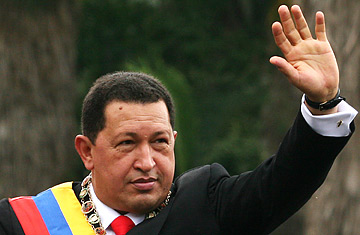
Venezuela's President Hugo Chavez waves to supporters as he rides in an open car to the Congress in Caracas, Wednesday, Jan. 10, 2007, where he was sworn in for a third term that runs until 2013.
To many in Washington, the emergence of Adan is one more reminder of Chavez's autocratic urges — and of the possibility that Chavez himself is Fidel Castro's real successor in Latin America. His nationalization scheme evokes the seizure of private businesses in Cuba after Castro's 1959 communist revolution: it ousts U.S.-based companies like Verizon, part-owner of the Venezuelan telecom giant CANTV, and the AES Corporation, which controls Venezuela's main power utility. Chavez asserted this week that while he'll compensate both U.S. firms, he won't pay them a market rate. And when the Bush Administration raised concerns about his burgeoning presidential powers, Chavez replied, in his usual charming fashion, "Go to hell, gringos!"
Yet, by objective standards, Chavez is still not Castro. Says one Chavez official, "We're a hell of a long way from a [Castro-style] regime." Chavez gushingly admires and subsidizes Castro. But many officials in Caracas, especially younger ones, wince when you equate the two. They insist their democratically elected commandante is hardly poised to snuff out free speech and free enterprise or stoke armed revolution abroad. Chavez may control the hemisphere's largest oil reserves, but they believe he can't afford to squander a more valuable commodity — his democratic legitimacy, something Castro never had and which gives Chavez the ability to blunt U.S. efforts to cast him as the Caribbean's new communist caudillo.
Even if Chavez were to turn Caracas into Havana, there is little Washington could do. The U.S. depends on Venezuela as its fourth largest foreign-crude supplier, which all but precludes swinging the trade embargo stick Washington has used against Castro for 45 years. Political isolation is a weak bet, too. In a region with the world's widest gap between rich and poor, Chavez's gospel of Latin American self-determination has spawned a resurgent left and unusually coordinated anti-Yanqui sentiment, evidenced by the region's rejection of President Bush's hemispheric free-trade proposal. Warns Luis Vicente Leon, head of the independent Caracas polling firm Datanalisis, "Every time the U.S. tries to demonize Chavez, it makes him larger than he really is."
Instead, the Bush Administration may finally realize that it's smarter to beat Chavez at his own game. That means rather than building multibillion-dollar fences against Mexican migrants, forcing the drug war on Bolivian coca farmers or hard-selling free-trade pacts to Nicaraguan street vendors who aren't likely to see their benefits, the U.S. is sending signals that it's ready to embrace the kind of policies that matter to Latin voters. Bush himself made a surprise phone call this month to Washington's bitter cold war enemy, Daniel Ortega of Nicaragua, to congratulate him on winning the presidency again and to pledge U.S. support in urgent areas like microfinancing for small- and medium-size businesses, which employ most Latin Americans. Experts cite myriad other privations they say the U.S. needs to focus on south of the border, including far better access to basics like health care, schools and potable water, and more reliable institutions like honest courts and cops — the kind that can battle Venezuela's soaring murder rate as well as Mexican drug gangs so vicious they're tossing rivals' decapitated heads into nightclubs.
If folks in the Yucatan and the Andes thought Washington was really engaging those needs, it might well give Chavez and his ilk less of an excuse to move further left. It might also help Latin America find its own third way between radical socialism and reactionary capitalism, extremes that pulled the region like a torture rack for most of the 20th century.
In a recent TIME interview, Chavez insisted, "I no longer think a third way is possible. Only socialism." Yet the fruits of materialism are alive and well in Venezuela: thanks to booming demand fueled by high oil prices, sales of BMWs jumped some 30% there last year. And Chavez will need foreign investors when oil prices drop far enough to make socialist dreams like state-run phone companies not viable.
Until then, says Leon, the U.S. should avoid the kind of diplomatic warfare that is Chavez's political oxygen. It made a start this month by finally indicting (at least on immigration charges) Luis Posada Carriles, an anti-Castro Cuban exile accused by Cuba and Venezuela in the 1976 bombing of a Cuban airliner as it left Venezuela. Chavez has pointed to the U.S.'s failure to prosecute Posada as evidence of Washington's double standard on terrorism. That charge could ebb if Bush puts Posada away — just as Chavez's anti-U.S. harangues have slowed ("Go to hell, gringos!" is actually subdued for Hugo) since the State Department said last month it was seeking "a positive, constructive relationship" in Chavez's new term.
Perhaps if we don't treat Chavez like Castro, the new theory suggests, the Venezuelan leader may be less compelled to become Castro.
